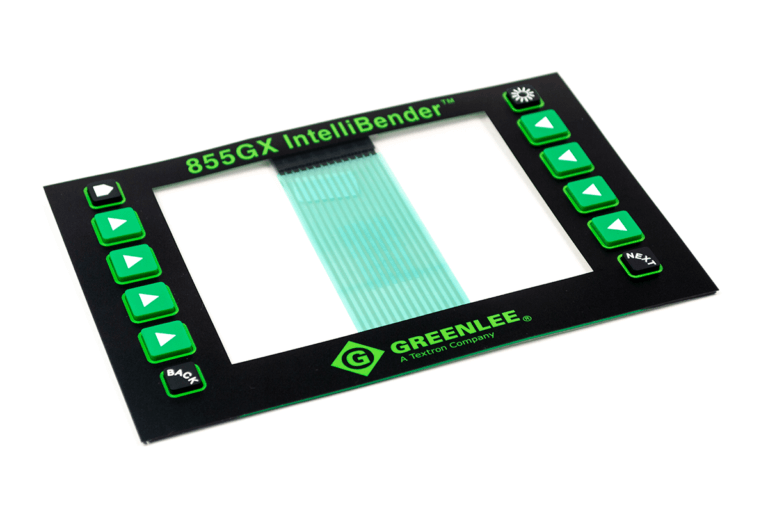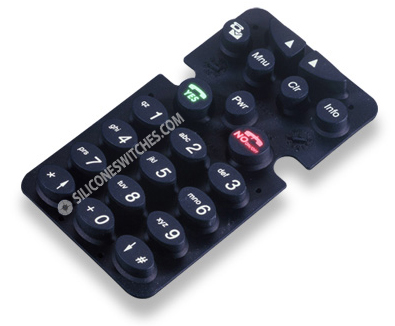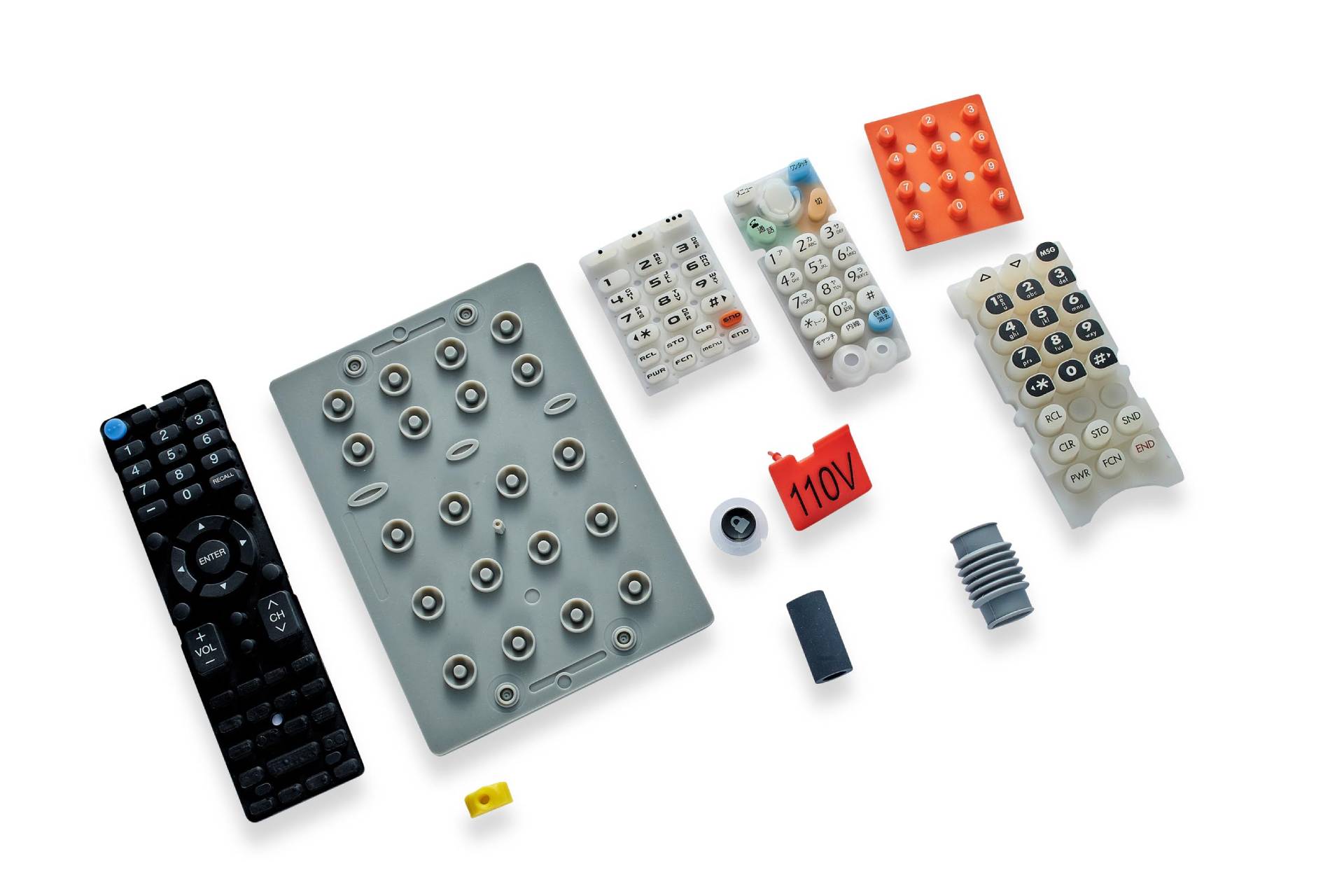Comprehending the Different Sorts Of Rubber Keypads and Their Vital Makes Use Of in Everyday Modern Technology
Rubber keypads play an essential function in contemporary innovation, functioning as user interfaces for countless gadgets. Various kinds, such as silicone rubber and membrane layer keypads, satisfy details applications and customer demands. Each kind supplies one-of-a-kind benefits, from flexibility to space-saving styles. Recognizing these differences is necessary for selecting the right keypad for an offered application. This expedition will certainly disclose not only the types available however likewise their effect across various sectors.
Overview of Rubber Keypads
Rubber keypads are versatile input devices commonly made use of in different electronic applications. Their building and construction normally involves silicone or rubber materials, which give a distinct responsive response when pushed. This tactile feedback enhances individual experience by allowing people to recognize crucial activation without needing to check out the device. Rubber keypads are often employed in consumer electronic devices, clinical devices, and commercial devices, offering sturdiness and resistance to ecological factors such as moisture and dirt. Additionally, they can be personalized pertaining to color, shape, and size to satisfy details design demands. The flexibility of rubber keypads permits consolidation into complex layouts, making them appropriate for compact devices where space is a restriction. In addition, their cost-effectiveness and ease of making add to their prevalent fostering throughout numerous sectors. Generally, rubber keypads play a crucial duty in enhancing use and capability in many technical applications.
Sorts Of Rubber Keypads
Various sorts of rubber keypads satisfy various applications and customer choices. Amongst the most typical types are silicone rubber keypads, known for their versatility and durability, making them suitable for portable devices and clinical equipment. Another type consists of conductive rubber keypads, which include ingrained conductive materials permitting reliable electrical contact, frequently found in digital devices. Membrane layer keypads, a subcategory of rubber keypads, contain layers that develop a flat interface, frequently utilized in home appliances and commercial applications for their space-saving layout. In addition, customized rubber keypads can be tailored to certain styles or performances, interesting niche markets such as pc gaming or specialized machinery. Each type serves unique objectives, boosting individual interaction and device dependability across numerous industries. These variations guarantee that rubber keypads meet the diverse needs of customers, providing functionality and convenience in everyday modern technology.
Key Functions of Rubber Keypads
Rubber keypads are acknowledged for their key features that boost use and performance. Their durability and durability make them excellent for numerous applications, while responsive reaction characteristics guarantee user complete satisfaction. Furthermore, the personalization alternatives readily available enable tailored layouts to fulfill details demands.
Durability and Long life

Tactile Response Characteristics
Keypads created with rubber products supply noteworthy responsive response features that enhance user interaction. These keypads provide an unique comments device, allowing users to really feel a visible click or resistance when secrets are pushed. This tactile responses is vital in applications where precision and precision are paramount, such as in clinical tools or commercial tools. The gentleness of rubber adds to a comfortable pressing experience, minimizing finger exhaustion during expanded use. Additionally, the style frequently permits differing vital heights and shapes, better enhancing the tactile experience. This responsiveness not just aids in stopping unintentional presses yet likewise enhances total user satisfaction, making rubber keypads a preferred choice in numerous technical tools.
Modification Options Available

Benefits of Utilizing Rubber Keypads
Rubber keypads provide numerous advantages that make them a popular choice throughout various applications. One key advantage is their sturdiness, as they can stand up to substantial damage, making them ideal for high-usage settings. Furthermore, rubber keypads offer excellent resistance to water, dirt, and chemicals, improving their longevity and reliability. The soft-touch surface area guarantees customer comfort, decreasing finger exhaustion during long term usage.
On top of that, their responsive comments enhances user experience, permitting accurate input recognition. The adaptability in design also allows custom forms and shades, enabling seamless combination right into numerous items. In addition, rubber keypads are usually cost-efficient compared to other products, making them a cost-effective choice for producers. They also sustain silent operation, which is optimal for environments where noise decrease is vital. On the whole, the mix of customization, longevity, and comfort makes rubber keypads a valuable component in numerous technological devices
Usual Applications in Customer Electronic Devices
Rubber keypads are commonly used in different customer electronics, serving vital functions in enhancing individual communication. They are generally discovered in remote interfaces, medical tool keypads, and home device controls. These applications highlight the versatility and usefulness of rubber keypads in everyday technology.
Push-button Control Interfaces
Remote control user interfaces are essential elements in contemporary consumer electronics, allowing users to connect effortlessly with devices from a range. These user interfaces utilize rubber keypads to provide responsive comments, enhancing individual experience. Common applications consist of tv remotes, pc gaming controllers, and smart home tools, where ease of usage is essential. The design of rubber keypads enables sturdiness, flexibility, and resistance to use, making them optimal for regular use. Various setups, including single-button and multi-button formats, satisfy diverse customer requirements and preferences. Furthermore, the dustproof and waterproof properties of rubber keypads ensure reliable performance in various environments. In general, rubber keypads in push-button control user interfaces play a crucial role in streamlining communications with technology, advertising convenience and ease of access for customers.
Clinical Tool Keypads
Keypads in medical devices offer a necessary function, making it possible for health care experts to operate devices efficiently and properly. These rubber keypads are page frequently found in devices such as high blood pressure monitors, glucose meters, and analysis tools. Their responsive feedback warranties that users can input commands without ambiguity, which is important in high-stakes settings. Furthermore, the resilience and resistance to wetness and chemicals make rubber keypads suitable for constant use in clinical setups. The ergonomic layout commonly fits gloved hands, improving functionality. Adjustable formats allow manufacturers to customize keypads to specific gadget features, enhancing procedures. Overall, medical tool keypads play a substantial function in improving client treatment through dependable and intuitive user interfaces.
Home Appliance Controls

Home home appliance controls play an essential duty in the functionality and customer experience of daily customer electronic devices. Rubber keypads use responsive feedback and longevity, making them suitable for tools such as microwaves, cleaning machines, and coffee machine. These keypads offer intuitive user interfaces, allowing individuals to easily browse settings and programs. The soft-touch style minimizes the danger of unexpected activation while making certain a comfy experience. Furthermore, rubber click to investigate keypads are immune to wetness and dust, which is important in cooking area and washing environments. They can also be tailored for particular features, boosting use. Overall, rubber keypads contribute greatly to the efficiency and reliability of home devices, making sure that customers can run their gadgets easily and effectively.
Industrial and Medical Use Rubber Keypads
Rubber keypads have actually come to be fundamental components in various industrial and medical applications due to their longevity and reliability. In commercial setups, these keypads are typically made use of in equipment controls, offering a responsive user interface that holds up against severe settings, consisting of exposure to chemicals and extreme temperature levels. Their resistance to great site tear and put on makes them excellent for heavy-use scenarios, where constant efficiency is essential.
In the clinical field, rubber keypads offer crucial features in gadgets such as analysis tools, patient surveillance systems, and research laboratory instruments. Their convenience of cleansing and capacity to withstand contamination help in preserving health criteria substantial to health care settings. Additionally, the customizability of rubber keypads enables ergonomic designs tailored to individual needs, enhancing accessibility for both medical professionals and clients. In general, the flexibility of rubber keypads guarantees their continued significance in medical and industrial modern technologies.
Elements to Take Into Consideration When Choosing Rubber Keypads
When choosing rubber keypads, a number of important factors should be taken into account to assure peak performance and compatibility with specific applications. The intended usage plays a considerable role; various environments, such as industrial or clinical settings, might call for unique attributes like antimicrobial buildings or enhanced longevity. Second, the responsive feedback is vital for customer complete satisfaction; a keypad should supply a receptive and comfy experience.
Furthermore, the style and design should be thought about, as custom sizes and shapes may be needed for specific devices. The material structure influences both the keypad's longevity and its resistance to chemicals or extreme temperature levels. Compatibility with electronic parts is critical; guaranteeing that the keypad incorporates effortlessly with existing innovation prevents functional concerns. Cost-effectiveness ought to be examined, stabilizing top quality and spending plan restrictions to achieve suitable worth without endangering efficiency.
Regularly Asked Concerns
Can Rubber Keypads Be Custom-made for Details Layouts or Logos?
Rubber keypads can certainly be personalized for details designs or logo designs. Producers provide numerous choices, enabling customers to inscribe unique graphics or message, improving branding while keeping performance in varied applications throughout various markets.
How Do Rubber Keypads Compare to Membrane Buttons?
Rubber keypads use tactile responses and longevity, while membrane layer buttons provide an even more structured design and are commonly thinner. Each has distinctive benefits, making the option depending on particular application needs and individual choices.
What Maintenance Is Needed for Rubber Keypads?
Rubber keypads require routine cleansing to stop dust accumulation, occasional assessment for wear or damages, and proper storage far from severe temperature levels. Guaranteeing they are devoid of wetness improves their long life and performance.
Are There Environmental Problems With Rubber Keypad Production?
Yes, ecological issues emerge from rubber keypad manufacturing, consisting of making use of non-renewable resources, contamination throughout making procedures, and difficulties in reusing. These variables add to a growing awareness of sustainability in the electronics sector.
For How Long Do Rubber Keypads Usually Last?
Rubber keypads commonly last in between 5 to ten years, relying on use and environmental conditions. Factors such as exposure to warmth, sunshine, and chemicals can substantially affect their resilience and total life-span.
Different kinds, such as silicone rubber and membrane keypads, provide to specific applications and user requirements. Membrane layer keypads, a subcategory of rubber keypads, consist of layers that develop a flat interface, generally used in devices and commercial applications for their space-saving design. Many products are made use of in keypad manufacturing, rubber keypads stand out due to their exceptional toughness and durability. Keypads developed with rubber materials supply notable tactile action qualities that enhance user communication. Furthermore, the customizability of rubber keypads permits for ergonomic styles tailored to individual requirements, enhancing ease of access for both medical specialists and people.